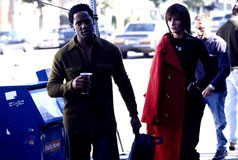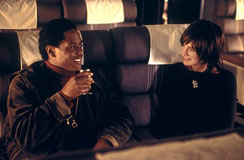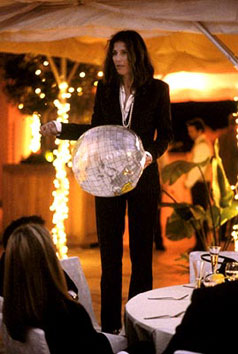Full Frontal (Steven Soderbergh) 2002
 Full Frontal, the latest film from Steven
Soderbergh, the American filmmaker who seems most stuck between the realms of
independent genius and studio hack (or is that independent hack and studio
genius?), has him directly confronting the disconnect between those two modes of
his filmmaking. Set in Hollywood, and revolving around the people we hate who
make the movies that we love, this movie, which was shot with a hand-held
digital camera, is intercut with segments from Rendezvous, a similarly
self-reflexive film within the film, which has been shot on actual celluloid
with a formalistic treatment. This treatment sets up in the audience a
questioning of reality that much of the dialogue scenes in the film explicitly
and implicitly address. Besides the obvious use of two mediums, there are clever
scenes like the one that shows us characters creating their “porno names”
juxtaposed against the testimonials of a masseuse that actually uses an assumed
name when working with her clients (and when she chats online). For a while, the
movie hums along with a surprisingly offhand and chaotic style, and you think
that it might be building to a genuinely revolutionary point, but it
unfortunately loses itself along the way, and descends into a series of
inconsistently giggle-worthy, but consistently empty skits.
Full Frontal, the latest film from Steven
Soderbergh, the American filmmaker who seems most stuck between the realms of
independent genius and studio hack (or is that independent hack and studio
genius?), has him directly confronting the disconnect between those two modes of
his filmmaking. Set in Hollywood, and revolving around the people we hate who
make the movies that we love, this movie, which was shot with a hand-held
digital camera, is intercut with segments from Rendezvous, a similarly
self-reflexive film within the film, which has been shot on actual celluloid
with a formalistic treatment. This treatment sets up in the audience a
questioning of reality that much of the dialogue scenes in the film explicitly
and implicitly address. Besides the obvious use of two mediums, there are clever
scenes like the one that shows us characters creating their “porno names”
juxtaposed against the testimonials of a masseuse that actually uses an assumed
name when working with her clients (and when she chats online). For a while, the
movie hums along with a surprisingly offhand and chaotic style, and you think
that it might be building to a genuinely revolutionary point, but it
unfortunately loses itself along the way, and descends into a series of
inconsistently giggle-worthy, but consistently empty skits.
 While watching Full Frontal, a host of
inconsistencies crop up. It doesn’t help matters that the film-within-the-film
Rendezvous isn’t for a moment believable as an actual Hollywood
production (but then again, neither is the David Fincher-directed
film-within-the-film-within-the-film). Its corny symbolism and dopey dialogue
really only make sense in the context of those “non-movie” scenes that
surround them. It seems to consist mostly of long dialogue sequences between an
actor and a reporter discussing the state of the black man in mainstream
American cinema. Such a stance coming from Steven Soderbergh placed in the mouth
of Julia Roberts feels like some sort of apology, since neither of them has an
excellent track record in their onscreen relationships with black actors. Full
Frontal explicitly brings up Julia’s chaste romance with Denzel Washington
in The Pelican Brief, but doesn’t mention the scene in Traffic
where a young girl’s sexual encounter with a black drug dealer is presented as
her worst imaginable offense. When it comes time to show a hot and heavy
interracial sex scene between two of the characters, though, Soderbergh shifts
his focus until it’s an abstraction, foisting a joke onto the audience that
makes them question his sincerity. You start to question the reality of the
framing device as well though, since its relationships are as constructed as the
ones in the movie, and when it starts pushing toward a big Hollywood ending,
Soderbergh attempts to salvage everything by telling you that it’s all a movie
and that none of it mattered.
While watching Full Frontal, a host of
inconsistencies crop up. It doesn’t help matters that the film-within-the-film
Rendezvous isn’t for a moment believable as an actual Hollywood
production (but then again, neither is the David Fincher-directed
film-within-the-film-within-the-film). Its corny symbolism and dopey dialogue
really only make sense in the context of those “non-movie” scenes that
surround them. It seems to consist mostly of long dialogue sequences between an
actor and a reporter discussing the state of the black man in mainstream
American cinema. Such a stance coming from Steven Soderbergh placed in the mouth
of Julia Roberts feels like some sort of apology, since neither of them has an
excellent track record in their onscreen relationships with black actors. Full
Frontal explicitly brings up Julia’s chaste romance with Denzel Washington
in The Pelican Brief, but doesn’t mention the scene in Traffic
where a young girl’s sexual encounter with a black drug dealer is presented as
her worst imaginable offense. When it comes time to show a hot and heavy
interracial sex scene between two of the characters, though, Soderbergh shifts
his focus until it’s an abstraction, foisting a joke onto the audience that
makes them question his sincerity. You start to question the reality of the
framing device as well though, since its relationships are as constructed as the
ones in the movie, and when it starts pushing toward a big Hollywood ending,
Soderbergh attempts to salvage everything by telling you that it’s all a movie
and that none of it mattered.
 This move seems calculated to piss off the audience, and I
imagine that for many people it worked, but mostly I was just left disappointed
that a director who seems as perceptive as Soderbergh couldn’t make a more
analytical statement about the reality of movies. Instead, he simply asks us to
let him off the hook for even attempting to tell a story in such an inadequate
medium and criticizes our naiveté for getting involved in the process of
watching this one. I suppose that sort of fourth-wall shattering moment is
supposed to be wild, and in a dramatic Hollywood film it might be, but since
this film announces itself so loudly as an experimental, quirky indie, you
can’t help but expect more of a result from the director’s experiments.
That’s not to say that Full Frontal is a total wash. I found several of
its comic skits to be funny, most notably those involving Catherine Keener, who
transcends her clichéd bitchy studio exec character’s limitations here with
her performance. She’s the one thing in the movie that really feels like
it’s operating without a net. Nicky Katt’s scenes where he plays an actor
impersonating Hitler, however, seemed as funny to me as genocide. Many
viewers’ reactions will probably differ greatly here, though, since the movie
throws so many disparate elements together. It’s as difficult to imagine
someone who will find nothing to like in Full Frontal as it is to
conceive of someone who can embrace everything it offers. It’s a film that’s too
wildly pieced together to inspire either knee-jerk admiration or derision.
This move seems calculated to piss off the audience, and I
imagine that for many people it worked, but mostly I was just left disappointed
that a director who seems as perceptive as Soderbergh couldn’t make a more
analytical statement about the reality of movies. Instead, he simply asks us to
let him off the hook for even attempting to tell a story in such an inadequate
medium and criticizes our naiveté for getting involved in the process of
watching this one. I suppose that sort of fourth-wall shattering moment is
supposed to be wild, and in a dramatic Hollywood film it might be, but since
this film announces itself so loudly as an experimental, quirky indie, you
can’t help but expect more of a result from the director’s experiments.
That’s not to say that Full Frontal is a total wash. I found several of
its comic skits to be funny, most notably those involving Catherine Keener, who
transcends her clichéd bitchy studio exec character’s limitations here with
her performance. She’s the one thing in the movie that really feels like
it’s operating without a net. Nicky Katt’s scenes where he plays an actor
impersonating Hitler, however, seemed as funny to me as genocide. Many
viewers’ reactions will probably differ greatly here, though, since the movie
throws so many disparate elements together. It’s as difficult to imagine
someone who will find nothing to like in Full Frontal as it is to
conceive of someone who can embrace everything it offers. It’s a film that’s too
wildly pieced together to inspire either knee-jerk admiration or derision.
* *
08-04-02
Jeremy Heilman